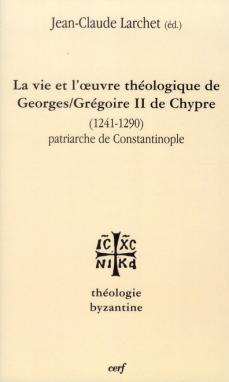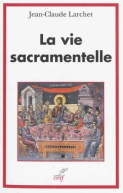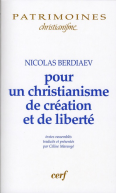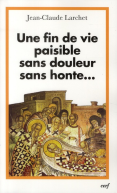
Vie et l'œuvre de Georges/Grégoire II de Chypre (1241-1290) patriarche de Constantinople (La)
Collection Théologies
334 pages - août 2012
35,00€
Georges de Chypre (1241-1290), un brillant écrivain byzantin qui devint patriarche de Constantinople de 1283 à 1289 sous le nom de Grégoire II, est encore peu connu en France : de nombreux petits articles lui ont, depuis longtemps, été consacrés, mais il n'a encore fait l'objet d'aucune étude d'envergure et aucune de ses œuvres n'a été traduite dans notre langue. Pourtant son nom revient souvent dans les réflexions sur la question du Filioque, en particulier dans le cadre des débats œcuméniques de fond visant à trouver un accord entre orthodoxes et catholiques, qui restent jusqu'à ce jour profondément divisés sur ce sujet. Sa pensée, en effet, offre des perspectives nouvelles puisque, tout en refusant fermement le filioquisme latin (selon lequel l'Esprit procède aussi du Fils), elle explicite l'idée de certains Pères grecs selon laquelle l'Esprit Saint procède du Père par le Fils dans un sens acceptable pour l'Église orthodoxe : celui d'une manifestation de l'Esprit non seulement temporelle (plan économique) mais éternelle (plan théologique). Ce volume, fruit d'un long travail qui a mobilisé des spécialistes de divers horizons, vient combler une lacune en offrant une synthèse précise et approfondie sur la vie, l'œuvre et la pensée théologique de Georges/Grégoire II de Chypre, la première liste complète de toutes ses œuvres, une bibliographie exhaustive des études qui lui ont été consacrées, et une traduction de ses œuvres théologiques qui, dans quatre cas sur cinq, est la toute première traduction dans une langue moderne. L'un des apports les plus nouveaux de ce livre est l'édition, accompagnée d'une traduction, d'une œuvre théologique importante écrite par Grégoire peu avant son accession au patriarcat, et restée jusqu'à présent mal identifiée et en très grande partie inédite : le « Discours antirrhétique ». Cette œuvre, la plus développée de Grégoire, non seulement révèle de nouveaux aspects de sa pensée théologique, mais contribue à éclairer des textes difficiles de quelques grands Pères de l'Église sur un thème particulièrement délicat de la théologie trinitaire.
--
Gregory of Cyprus (1241-1290), a brilliant Byzantine writer who became Patriarch of Constantinople between 1283 and 1289 under the title of ‘Gregory II’, is still little-known in France: many brief articles have been devoted to him but he has not been the subject of an extensive study and none of his works have been translated into French. Yet his name often turns up in reflections on the question of Filioque, especially in the context of fundamental ecumenical debates whose aim is to find agreement between the Orthodox and the Catholic Churches, still deeply divided today on this subject. Gregory’s thinking does indeed open up new perspectives, because while firmly refusing Latin filioquism (according to which the Spirit precedes the Son), he develops the idea of certain Greek Fathers - that the Holy Spirit comes from the Father through the Son - an interpretation that is acceptable to the Orthodox Church: that of a manifestation of the Spirit not only temporal (on the economic level) but eternal (on the theological level). This volume, the fruit of many years of work by specialists from diverse hori¬zons, fills a very real gap by offering several things: a precise and in-depth overview on the life, work and thinking of Gregory of Cyprus; the first complete list of his works; an exhaustive bibliography of studies devoted to him; and a translation of his theological writings. In four out of five cases, they represent the first translations into a modern language. One of the most innovating aspects of this book is the publication, accompanied by a translation, of an important work of theology written by Gregory a short time before he became Patriarch. Unidentified until now, much of it has never been published: the Antirrhetic discourses. The most developed of all Gregory’s writings, it not only reveals new aspects of his theological philosophy, but enlightens difficult texts of the great Fathers of the Church on a particularly delicate theme of Trinitarian theology.
- Dimensions : 145x235
- ISBN : 9782204097154
- Poids : 500 grammes
Avec la collaboration de : Chrysostomos Sabbatos, Françoise Vinel, Jean-Claude Larchet, Théophile Kislas
DU MÊME AUTEUR
Divinisation de l'homme selon saint Maxime le Confesseur (La) - CF 194
de Jean-Claude Larchet
768 pages - mars 1996
> VOIR TOUS LES LIVRES DE l'AUTEUR
DANS LA CATÉGORIE INTRODUCTION AUX CHRISTIANISMES
Une fin de vie paisible, sans douleur, sans honte...
Un éclairage orthodoxe sur les questions éthiques liées à la fin de la vie
de Jean-Claude Larchet
240 pages - mai 2010










